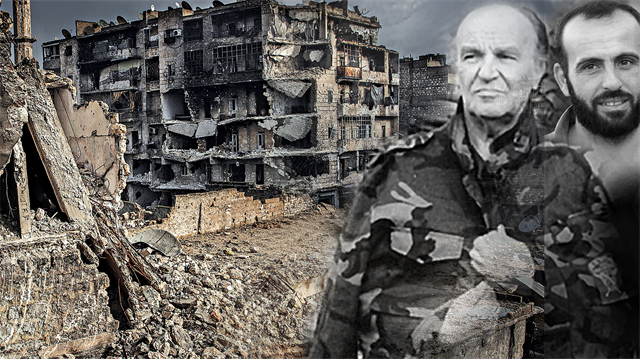

Alija Izetbegović, first President of the newly-independent Republic of Bosnia and Herzegovina (left), Abdul Qader Saleh leading pioneer figure of Syrian opposition (right)
Witnessing brutal airstrikes and massacres, Aleppo shares the same fate with Srebrenica, where thousands of Muslims were killed in 1995 by Serbians who conducted genocide there
The northern Syrian province of Aleppo, which has been devastated by brutal airstrikes and massacres, reminds the world of the town in Bosnia and Herzegovina, Srebrenica, where about 8,000 Bosnian Muslim men and boys were killed after the Bosnian Serb army attacked the U.N. “safe area" of the town.
As the Srebrenica genocide, the massive massacre that has been conducted by the Russia and Iran-backed regime forces, turned into a genocide, until Turkey became successful in all of its diplomatic efforts that concluded with the opening of the corridor to evacuate the desperate victims of the brutal attacks in the city. Despite the fact that the evacuation began, the whole process is estimated to last minimum 25 days, until all victims of the attacks are rescued.
Similar to Srebrenica, a large number of people were systematically killed in Aleppo. The figures show that the genocide in Srebrenica was conducted in 1992-1995; while Aleppo has been witnessing violence spanning four years.
In Srebrenica, 8,372 people were killed, while in Aleppo the number of casualties reached 100,000.
The number of the people left their houses due to the violence, while more than 1 million left their houses.
Two disgraces for humanity: Srebrenica, Aleppo
Due to the violence in the Syrian town, Aleppo was considered to be the “Srebrenica" of the 21th century, as the attacks in Syria began in 2012 as a part the Syrian Civil War that initiated in 2011.
More than 1 million people left their houses, while tens of thousands were killed.
Also, since November 15, the Russia and Iran-backed Assad regime intensified its attacks on the Syrian province of Aleppo, located 50 kilometers from Turkey.
The intense attacks were concluded with the fall of Aleppo, where moderate opposition has substantial control.
During the war, more than 100,000 were killed only in Aleppo, while the total death toll since 2011 exceeded 600,000.
What made the death toll increase was the lack of security measures in Aleppo, as Western countries didn't put their efforts into having Aleppo become a no-fly zone while Srebrenica was actually declared a “no-fly zone". Despite the violations of the Serbian forces, the security measure decreased the number of the victims of the attack in the Bosnian town; while Aleppo has been witnessing giant attacks.
What happened in Srebrenica?
Srebrenica was besieged by Serb forces between 1992 and 1995 during the Bosnian War. Back then, Serb militias were trying to wrest territory from Bosnian Muslims and Croats to form their own state.
The UN Security Council declared Srebrenica a "safe area" in the spring of 1993. However, Serb troops led by General Ratko Mladic – who now faces genocide charges in The Hague – overran the UN zone despite the presence of around 450 Dutch soldiers tasked with acting as UN peacekeepers.
The Dutch troops failed to act, as Serb forces occupied the area, killing about 2,000 men and boys on July 11 alone.
Some 15,000 Srebrenica men fled into the surrounding mountains, but Serb troops hunted down and slaughtered 6,000 of them in the forests.
#Aleppo
#Srebrenica
#Syria



